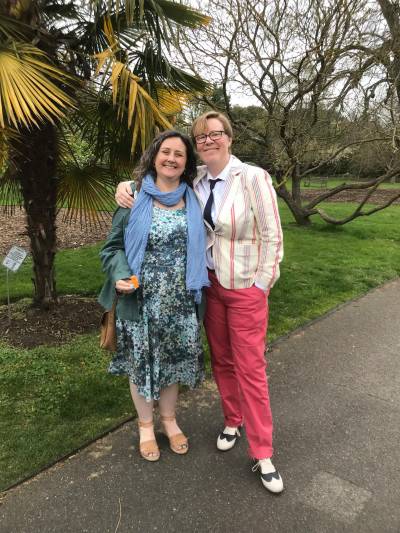
1⃣ The LGBTQ+ community brings together an incredible variety of identities, how do you identify yourself within (and beyond) our world?
I suppose the nearest term to describe me – without sounding too much like the Liberal Democrat MP Layla Moran(!) – is bi. I have always found this a tricky identity to navigate. I knew I was bi from a pretty early age and had plenty of crushes on girls. But I was in a long-term relationship with a lovely man for a lot of my twenties (in fact, we even, rather unwisely, got married), so I was only ‘out’ to him, my sister and other people I really trusted. Until our divorce (for unrelated reasons), I thought I could carry on that way. It was only when I got together with my amazing partner, Rachel, aged 36, that I fully came out to my whole family and community, who admittedly were mostly unsurprised. Even now, though, I cringe second-guessing whether people think I was going through ‘a phase’ or they think I’m going through one now. (It’s neither.) I’ve recently been reading that people who identify as bi are even more vulnerable than lesbian and gay people to mental health issues, and even suicide, partly because of this experience of ‘identity management’. So, even though I have been very lucky in my life, I think it’s an important thing to talk about.
2⃣ How does your LGBTQ+ identity influence your work/studies at UCL?
I had an important formative experience of taking a class when I was an undergraduate that got me reading queer theory and fiction. This was incredibly important and affirming for me, especially in those days (the ‘90s), when those ideas were not as well known as they are now. I therefore try to pay it forward and make sure that I introduce my own students to ideas about sexuality and queer theory and talk about the politics of sexuality in the classroom. I also ran a project to audit the department’s reading list jointly with students a couple of years back and our finding that only 0.8% of readings on our reading lists deal with issues of sexuality were an important provocation to improve that, which I think we are now doing.
Queer theory teaches us that all hierarchies, binaries and exclusions are intersecting and interlinked, so it also inspires me to read, cite and teach all sorts of marginalised work and ideas. To be honest, I also find that more intellectually interesting.
3⃣ What do you think is the most important cause LGBTQ+ people should fight for in the coming years?
Without a doubt, trans rights and recognition. #BWithTheT
 Close
Close

